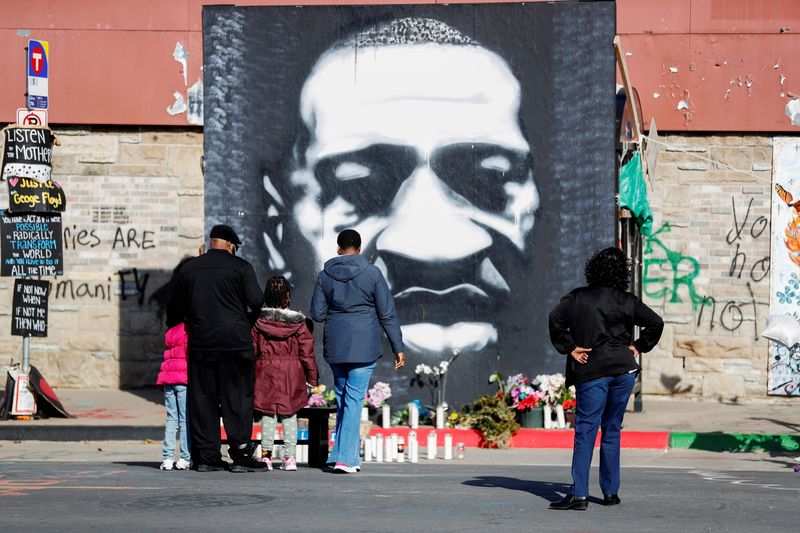(Refiles to drop extraneous word in paragraph 11)
By Jonathan Allen and Brendan O'Brien
MINNEAPOLIS (Reuters) -The Minneapolis Police Department's coordinator on the use of force told jurors on Tuesday the neck restraint applied by former policeman Derek Chauvin in the deadly arrest of George Floyd was unauthorized and that officers are trained to use the least amount of force necessary.
Prosecutors in Chauvin's murder trial presented three department witnesses to try to show that he disregarded training on appropriate use of force, employing cardiopulmonary resuscitation (CPR) and dealing with crisis situations when he knelt on Floyd's neck for more than nine minutes.
The handcuffed 46-year-old Black man fell limp and stopped breathing during the May 2020 arrest.
Lieutenant Johnny Mercil, who teaches the proper use of force for the department, was shown by one of the prosecutors a photograph of Chauvin using his knee to pin Floyd's neck to the ground and was asked if the officer was using an authorized neck restraint under the circumstances.
"I would say no," Lieutenant Mercil testified.
Chauvin, who is white, has pleaded not guilty to murder and manslaughter charges. Chauvin and three other officers were attempting to arrest Floyd on suspicion of using a fake $20 bill to buy cigarettes at a food store. The incident prompted protests in cities across the United States and around the world against racism and police brutality.
Here is some testimony and highlights from court on Tuesday:
LIEUTENANT JOHNNY MERCIL, USE-OF-FORCE INSTRUCTOR WITH MINNEAPOLIS POLICE DEPARTMENT
Mercil testified that officers are trained to use a proportional amount of force and on how to properly use neck restraints, handcuffs and straps.
"If you can use the least amount of force to meet your objectives, it is safer and better," Mercil testified.
Mercil testified that a neck restraint designed to render a suspect unconscious is authorized only when the suspect is actively and aggressively resisting.
On cross examination, Mercil agreed with Chauvin's attorney Eric Nelson when asked whether officers must protect themselves when arresting unruly subjects during evolving situations. Nelson also questioned Mercil about safety precautions officers need to take when using neck restraints and using body weight to restrain individuals.
"We tell them to stay away from the neck when possible," Mercil told jurors.
The city's police chief testified on Monday that Chauvin violated department rules and its ethics code while arresting Floyd.
NICOLE MACKENZIE, MEDICAL SUPPORT COORDINATOR
Officer Nicole Mackenzie, who trained officers including Chauvin in how and when to perform CPR, also testified. She told the jury that if officers cannot find a pulse on a subject, they are taught to immediately begin CPR and to administer first aid if they encounter a medical emergency. In this incident, Chauvin did not do so.
"Just because they're speaking doesn't mean they're breathing adequately," Mackenzie testified when a prosecutor asked if a person can speak if they cannot breath.
Questioned by the defense, Mackenzie testified that officers must take into account the impact drugs may have on a subject's behavior and that they should also consider the safety of their surroundings when deciding whether to administer first aid.
SERGEANT KER YANG, CRISIS INTERVENTION TRAINING COORDINATOR
Sergeant Ker Yang, a crisis intervention training coordinator for the department, testified as the day's first witness that Chauvin completed 40 hours of training on dealing with suspects going through a crisis.
Yang said police are trained to use principles such as neutrality, respect and trust in crisis intervention situations, and how to spot and interact with suspects going through a crisis.
HEARING ON REQUEST TO QUASH SUBPOENA
Before the jury was brought into the courtroom in the morning, Hennepin County District Judge Peter Cahill heard arguments on a request by a friend of Floyd to quash a prosecution subpoena for him to testify.
The friend, Morries Hall, was in the car with Floyd when police arrived. Hall has said that he would invoke his constitutional right against self-incrimination if he had to appear in the witness stand.
Nelson told Cahill he planned to ask Hall whether he gave Floyd any controlled substances and why Hall left Minnesota immediately after the incident. Floyd's girlfriend testified last week that she and Floyd struggled with opioid addiction, and that she thought Hall sometimes illegally sold pills to Floyd.
The judge said Hall should be able to testify on Floyd's condition in the car and whether he fell asleep suddenly after possibly taking opioid pills. Cahill gave Nelson until Thursday to draft potential questions.
The county medical examiner has ruled Floyd's death a homicide at the hands of the police, and noted Floyd had also taken the fentanyl and methamphetamine before his death. Chauvin's lawyers argue Floyd's death was a drug overdose, though prosecutors have said medical evidence would contradict that.
